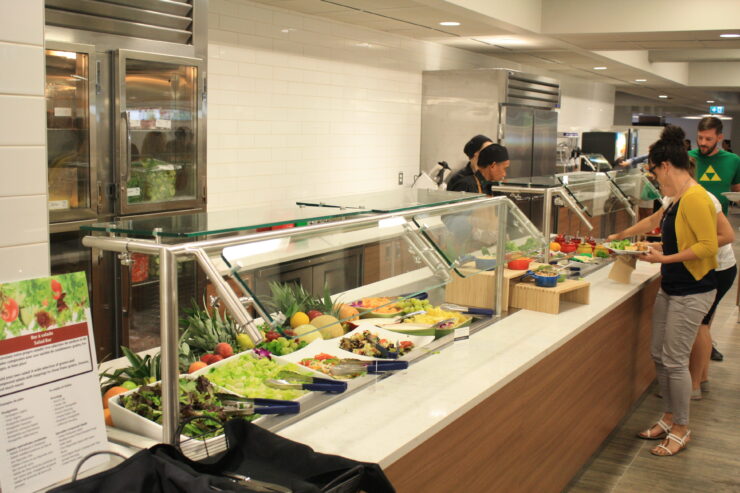New caf comes without waste but with mandatory meal plans
A variety of foods are offered at the University’s new cafeteria. Photo by Eric Davidson
After a summer of renovations, the University of Ottawa’s new 24/7 buffet-style dining hall will be looking to put its best food forward. The cafeteria opened on Sept. 5, as students flooded into campus.
The 680-seat facility is a completely new and improved dining experience for students, professors, staff, and visitors.
The 20,000 square-foot space also has hundreds of places to plug in laptops and phones. Students will also have access to a lounge and a games room.
“We want students to feel like it’s not just a dining location, it’s a place where people can socialize, make new friends, and work together,” said Patrick Genest, director of Food Services.
The new dining hall has eleven different food stations, including a deli station, salad bar, grill, soup station, dessert station, and drink station. There will also be a special diet station, where vegetarian, vegan, gluten-free, and pre-ordered meals for students with allergies and intolerances will be available.
One new addition will be a “pantry” section, where students will be able to cook their own food, with the assistance of kitchen staff. In addition to access to a fully stocked fridge, there are also induction plates, pots and pans, Vitamix blenders, and waffle irons.
With this new dining hall, the U of O has been able to expand on its environmental sustainability initiative. The hall is 95 per cent waste-free, and there will only be compost bins in the cafeteria. For students who can’t stay and sit, there is also special on-the-go meals that will also be waste-free.
The new dining hall is the second in Canada to offer 24/7 service, the first being Simon Fraser University. Students are able to purchase meal plans for unlimited access, but there are other options, such as pay-at-the-door rates and block plans. Starting this year meal plans are mandatory for all first-year students living in residences, excluding Brooks, Hyman-Soloway, Friel, Rideau, and Henderson.
However, these mandatory meal plans have not come into effect this year without opposition.
Former Student Federation of the University of Ottawa (SFUO) president Anne-Marie Roy said in a previous edition of the Fulcrum that the university was funding the new cafeteria “on the backs of students.”
Genest, told the Fulcrum in an interview in January that 60 per cent of students bought the meal plan before it became mandatory. He also stated that “students do have the choice of changing from one residence to another,” though the residences without a mandatory meal plan are more expensive than those with it.
The university had previously stated that they would pay for 20 to 25 per cent of the new cafeteria, with Food Services paying the rest. “All profits (from the cafeteria) are reinvested in Food Services,” said Genest in January.
“We want students to love it, to feel like it’s their home away from home,” he said.




